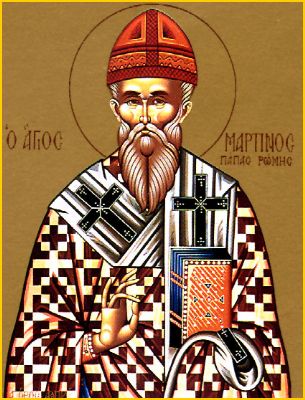|
|||
|---|---|---|---|
| This weekly bulletin insert complements the curriculum published by the Department of Christian Education of the Orthodox Church in America. This and many other Christian Education resources are available at http://dce.oca.org. | |||

The Church honors a seventh-century Roman Pope who had to fight for the Orthodox faith against a Patriarch and the Emperor himself. Saint Martin, Confessor and Pope of Rome, was from Tuscany. He was chosen as Pope at a time of raging controversy in the Church. As Orthodox Christianity teaches that Jesus Christ had two natures, divine and human, it also teaches that He had two wills, divine and human. Jesus Christ was truly and fully man, so He acted with a human will. He was truly and fully divine, so He submitted His human will to the divine will that He shared with His Father and the Holy Spirit. A wrong teaching, that Christ had only one will, was spreading through the Church in Saint Martin's time. Even Patriarch Paul of Constantinople adhered to the "Monothelite" heresy. The Emperor Constans II, another adherent, published a document upholding the wrong teaching. Saint Martin tried unsuccessfully to bring the Patriarch back to the Orthodox faith. His efforts infuriated the Emperor, who resented his staunch refusal to support the popular teaching of one will. But Martin knew the faith, and would not compromise it. He understood that Jesus Christ had to be fully human, having a real human will which He chose to submit to the divine will, in order to save us. Martin was imprisoned, publicly humiliated, and tortured. He was ill and physically mutilated when he died in 655, just 25 years before the Monothelite teaching was condemned at the Sixth Ecumenical Council. In our own time, wrong and harmful ideas about Christianity have become widely popular. Among the proponents of these ideas is the "new atheist" Richard Dawkins. His book "The God Delusion" ridicules the faith, as do many other books, and countless TV shows and movies. A Dominican friar, Father Thomas Crean, has written a helpful book called "God is No Delusion" to refute Dawkins. Though Roman Catholic in tone, it convincingly exposes Dawkins' poor scholarship and weak arguments.
The chapter entitled "Professor Dawkins and the Gospels" is especially useful. Here Father Crean points out, for example, that while there are only five surviving manuscripts of Aristotle's works, there are more than 5300 of the New Testament in Greek alone. How, he asks, can Dawkins and others question the reliability of the New Testament documents, when they accept without dispute that Aristotle wrote the works attributed to him? Father Crean thoroughly refutes other Dawkins claims, such as his assertion that we have no good evidence that Jesus Christ thought He was divine. We need to know our faith in order to share it. We need to share it in order to help our children and others live in faithful hope, rather than accepting the idea that salvation is meaningless and that God is a "delusion" foisted on people by liars and gullible fools. Saint Martin stands with us to encourage us in our efforts to know, to share, and to rejoice in our faith. |
|||
